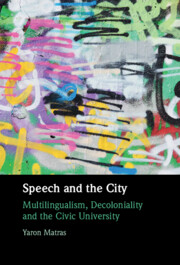Book contents
- Speech and the City
- Speech and the City
- Copyright page
- Dedication
- Contents
- Disclaimer in Regard to Website Content
- Preface
- Acknowledgements
- 1 Linguaphobia
- 2 The City as Multilingual Utopia
- 3 (Re)claiming Knowledge
- 4 Access and Agency
- 5 Heritage and Skills
- 6 Celebration and Citizenship
- 7 Academia and Advocacy
- 8 The Mirage of the Civic University
- References
- Index of Names
- Index of Subjects
8 - The Mirage of the Civic University
Published online by Cambridge University Press: 23 May 2024
- Speech and the City
- Speech and the City
- Copyright page
- Dedication
- Contents
- Disclaimer in Regard to Website Content
- Preface
- Acknowledgements
- 1 Linguaphobia
- 2 The City as Multilingual Utopia
- 3 (Re)claiming Knowledge
- 4 Access and Agency
- 5 Heritage and Skills
- 6 Celebration and Citizenship
- 7 Academia and Advocacy
- 8 The Mirage of the Civic University
- References
- Index of Names
- Index of Subjects
Summary
Linguistic citizenship is anchored in a decolonial critique of knowledge construction and power relations. It is an act of innovation but also an act of opposition. By wanting to strengthen agency it is inventive. But it also threatens to reclaim spaces that managers seek to control. Studies have referred to universities as ‘colonial enterprises’ and 'ruthless corporations' where complaints against racism are routinely dismissed. If universities are not multicultural spaces where diversity of communication modes is acceptable and practical ways to accommodate them are explored and if necessary constantly revised, then as institutions they cannot play a credible role in leading the promotion, construction and defence of multicultural and multilingual spaces in their immediate civic environments. The university cannot be a civic university if it refuses to decolonise. Multilingual Manchester (MLM) succeeded in shaping a novel concept of linguistic citizenship. Elements of the city language narrative are likely to stay. But there is a real risk that their content will be diluted as they are appropriated to serve corporate branding and profitability interests.
- Type
- Chapter
- Information
- Speech and the CityMultilingualism, Decoloniality and the Civic University, pp. 142 - 151Publisher: Cambridge University PressPrint publication year: 2024



